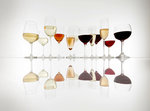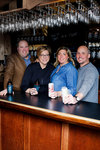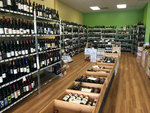



Michigan might be known for its auto manufacturing prowess, but another, tastier industry is also making its mark on the Great Lakes state.
From the Lake Michigan Shore Wine Trail to right here in Mid-Michigan, there’s no shortage of wineries and tasting rooms for both newbies and certified cork dorks to appreciate.
Over 160 wineries and 3,000 acres of wine grapes grace the Great Lakes state, and that’s thanks to rapid growth. Since 1991, there has been an increase of over 1,000% in Michigan wineries, according to the Michigan Wine Collaborative. The collaborative is a nonprofit supporting the wine industry through marketing and promotion. It was created in 2016 after the Michigan Grape and Wine Industry Council was dissolved.
“The Michigan wine scene is really exciting,” said Emily Dockery, the collaborative’s executive director. “We are planting a lot smarter and utilizing really innovative varieties. We’re at the cusp of history with that stuff, especially with cold climate plantings.”
Dockery considers the industry in Michigan to be strong, with plenty of opportunity for growth. The Lake Michigan shore AVA, which stands for American viticultural area, and the Leelanau AVA are two of the hottest spots for wineries and vineyards in the state. Dockery said most vineyards are located within 20 miles of Lake Michigan.
But that doesn’t mean vineyards and wineries have to be in an AVA hotspot to see success.
There are plenty of local must-try locations close to home. Here are just a few.
“The connoisseur does not drink wine but tastes its secrets.”
— Salvador Dali
Local Wineries
Petite, quaint and local were the words Deb Burgdorf used to describe her and her husband’s rural establishment, Burgdorf’s Winery.
In 2005, the Burgdorfs were nearing retirement. The couple knew they’d need something to keep them occupied, and Deb Burgdorf said her husband, Dave Burgdorf, has never been one to sit still. The industrious couple humbly formed their business in their three-car garage. By 2009, the couple built a barn in their backyard to house all the tools necessary for wine-making — tanks, barrels, a bottle room and “Deb’s Lab,” where she puts her microbiology and fermentation background to use.
“We were both in science fields,” she said. “We weren’t in business. We had to learn on the job what to do. We had no clue all the hoops you have to jump through.”
Dave Burgdorf, 70, worked as an agronomist for the United States Department of Agriculture before his retirement. He and his wife share the belief that to call themselves a Michigan winery, all the fruit they used had to be grown in the state. Dave Burgdorf said the “biggest thing” for them as winemakers is ensuring their products are Mitten-grown. The duo trademarked the phrases “Truly Michigan” and “True Michigan” and gave each bottle a gold seal to show customers that the wine is 100% Michigan-made and supports local farmers.
“We grow very little,” Deb Burgdorf said. “We have just enough to show and tell people how the grapes grow and when the grapes come off the vines. But for the most part, everything is Michigan grown and brought in fresh.”
Once the Burgdorfs receive shipments of grapes and other fruits, the real magic begins. The couple’s winemaking facility is complete with 55 jacketed tanks — ranging from 200 liters to 400 liters — with temperature controls for the fermentation process. There’s also the massive crusher de-stemmer, tons of barrels and a bottling room. They produce 4,000 cases of wine each year — a sizeable jump from the original 500. Still, it’s run a small operation.
“Nothing is automated,” she said. “It’s all hand-done with five people.”
In total, the Burgdorfs have a staff of “about 10,” who are all “pretty much part-time.” Their family helps with events and such when they can, but relatives are spread out across the country.
When the family gathered for Easter, the afternoon included an egg hunt around the Haslett winery for the grandchildren — ages three, eight and 10.
Like any true winemaking grandparents would, the pair have wines named after their three grandchildren: Faye, a cabernet franc aged in French oak; Finlay’s Reserve, a blend of three grapes into a “bold, dry red”; and Fischer’s Reserve, a hybrid red wine. The couple plans to make large bottles of each and save them for when the grandkids are of drinking age.
And, of course, being so close to East Lansing, the winery has a series called Spartan wines, with a white, blush, red and bourbon-barreled reserve.
Despite retirement from her previous career, Deb Burgdorf noted winemaking has become a full-time gig for her and her husband. Running the business out of their home also impacts privacy, but she said they have mornings and evenings to themselves.
“People can get away, sit outside and have a glass of wine,” she said. “It’s different from going to a restaurant because of the atmosphere, and they know it’s made right here. It’s an interesting place.”
Beyond that, Burgdorf’s offers winery tours, hosts private events and has a tasting room stocked with all things wine — like stemless glasses, a wine purse and decorations with all kinds of wine puns. Deb Burgdorf said her husband acts as the tour guide, mixing humor with education for an unforgettable winery experience.
For those who cannot make it to the wooded outskirts of Haslett, their wines are available at local shops like Horrock’s Farm Market and Quality Dairy. But, to truly experience Burgdorf’s, it’s worth the drive.
Driving north from Lansing on US-127, you can’t miss the big red barn on the hill with “Uncle John’s Cider Mill” in tall white lettering.
Over the last 50 years, the 200-acre farm has grown into a hotspot for both college students and Mid-Michigan families during summer and fall months. Activities include live music, pumpkin patches, craft shows and a fall festival. The family fun is brought to the public by the Beck family, who have owned the farm since the 1970s after John “Uncle John” Beck and his wife, Carolyn, bought it from his parents.
“I see everyone from all walks of life,” said Dede Beck, co-owner of Uncle John’s, “and it makes me so happy, because I look around and it’s clear we’re not attracting just one group of people.”
Uncle John’s is well-known for the array of not only fresh apple cider, but also hard cider flavors, which Dede Beck, 51, said started 19 years ago, as a way to do more with the apples. But Uncle John’s also makes another adult beverage: wine.
“Wine and hard cider are, essentially, the same thing,” Dede Beck said. “It’s just fermented fruit. When you break it down, hard ciders have a lower alcohol content, usually.”
Beck, who co-owns the mill with her husband, Mike Beck, and her brother-in-law, John Heystek, said the wines are all “very simple.” There’s a red wine and a white wine, and also a variety of fruit wines — concord, peach, cherry and cranberry.
“We have a line of mead wines, which are wines made with honey,” she said. “A lot of the mead wines are overlooked, because people don’t understand what they are. They’re just a lot more complex and have great flavors.”
Beck’s favorite wine from Uncle John’s is the “pyment,” a grape and honey wine that she “just loves.” She said mead wines are the way to go. Beck noted the wine and hard cider made at the cider mill are made with Michigan-grown fruits. Uncle John’s doesn’t grow all the fruit because, as she said, “we just don’t have enough trees.”
“These are wines people have liked over the years,” she said. “We haven’t expanded a ton on our wine line, because we put the focus on hard ciders.”
The cider mill has a tasting room — which opens Memorial Day weekend — where visitors can try the hard ciders and wines in flights.
“People can pick four different things and mix and match any of the wines or ciders together,” Dede Beck said. “It really gives them a good opportunity to sit down and enjoy the product.”
For those looking to get some sun, Uncle John’s has plenty of events planned for the summer and is set to open on Thursday, May 26. Beck noted the cider mill is putting “a little more effort” into summer events compared to before, but her and her family try to hone in on tradition. Like many other family businesses, it’s all about the “core values.”
“I think farmers are humble to a fault,” she said. “We’re not good braggers, but we like to have people on our property and we enjoy what we do. We just want to share that.”
LOCAL RETAIL
Merry Hass never owned a business before. And she never felt the urge to open her own business.
Then, in 2019, she and her husband, Brian Hass, opened The Port in downtown Portland. “It was truly a calling from God,” she said. “There’s nothing else to it. That’s all it was.”
Merry Hass, 53, said she was never a big drinker, and she was especially not a wine enthusiast. She partnered with Modern Craft Wine, a Michigan-based wine producer with wines that are meant to be mixed with other drinks, and operates a tasting room out of The Port.
“Honestly, I think Modern Craft has been in the leading edge in Michigan wine,” Merry Hass said. “We mix wines together. We put pop, juice and Redbull into our wines. Just a splash to change the flavor.”
Modern Craft has six tasting room locations throughout the state — The Port being one of them. The Port also features a candle-making bar and an events space.
“For us, it’s more about the experience for people,” she said. “We do have, what they call, the ‘pinky-up’ wines for those who like that. It’s fun to cater to those people and introduce them to something a little bit different.”
Hass described the atmosphere as relaxing, and she said she hopes her customers connect with one another while they visit and shop from 100% Michigan-made products.
“It’s a great gathering place,” she said.
Certified sommeliers will accompany customers at Vine and Brew, where guests can choose from thousands of wines and beers. The store offers a unique selection of wines, including those made by independent producers and “boutique wines” that may not be found elsewhere. The workers can answer any questions and help pair a wine with a dinner or event.
In 1981, Clarence “Dusty” Rhodes opened Dusty’s Cellar after traveling the world as a broadcast journalist. A series of businesses influenced by his travels and passion for “a great meal with great company” were established over the years. In 1995, his son, Matt Rhodes, purchased the business and has continued to carry on the legacy, even after his father’s passing in 2010. Dusty’s features an impressive bakery, restaurant, wine bar, tap room and shop full of unique goodies.
WINECATION
After living in North Carolina and Virginia, Jessica Youngblood was inspired by the vast wine country there. When she moved back to her family’s farm in southeast Michigan, she wanted to recreate the experience. In 2016, the Youngbloods planted their vineyard and the first crop came two years later. By 2019, Youngblood Vineyard was open for business.
“Our philosophy is that we are farmers first and the wine is secondary to what we do, which gives us complete control over the winemaking process,” Youngblood said. “We’re also the only commercial vineyard in all of metro Detroit. And we make all of our wine from our own grapes.”
Youngblood, 46, noted the vineyard has been 100% estate-grown since day one, even after losing 80% of the crop in 2020. This year, the vineyard produced 2,600 cases of wine. Once the vineyard has matured, she predicted they could see just under 6,000 cases.
“We’re a big advocate of teaching and learning,” she said. “We encourage people to come and go out into the vineyard. That’s why we don’t have a tasting room offsite, because we want people to see the vines and know where their wine came from.”
Youngblood Vineyard, which serves as a learning vineyard, also hosts unique events like tiny goat yoga and fireworks shows. The official opening date is Saturday, May 28 for Memorial Day weekend.
Located in Traverse City’s old asylum, Left Foot Charley, or LFC, was established in 2004. Winemaker Bryan Ulbrich and his wife, Jennifer, saved a vineyard from disaster and created their first dry Riesling. LFC gets its grapes from small, locally-owned vineyards to bring a variety of aroma and flavors to the region. Last November, LFC won an award for its 2019 Le Caban Riesling in the Jefferson Cup Invitational, a competition showing the diversity of wine in the United States.
The longest-operating, largest and most-awarded winery in Michigan is arguably St. Julian Winery & Distillery, an institution in Paw Paw for more than 100 years. The notable tasting room blends history and tradition with a modern appeal.
Alyssa Sonnevil, director of marketing, said around 99% of ingredients are grown close by.
“The idea of being Michigan-grown is at the forefront of what we do,” she said. “We use all Michigan-grown inputs and craft unique, innovative wines and more traditional wines from the grapes here in Michigan.”
Sonnevil noted the winery aims to “elevate the Michigan wine scene,” with flavors like cotton candy and Blue Heron — a blend of pear and mango. So, while you’re out exploring the new additions to the Michigan wine scene, be sure to not forget about the long-running fixtures. Many, like St. Julian, have aged like wine.
Support City Pulse - Donate Today!
Comments
No comments on this item Please log in to comment by clicking here